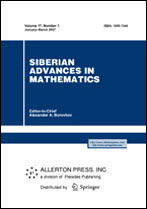|
This article is cited in 4 scientific papers (total in 4 papers)
Convergence of the successive approximation method in the Cauchy problem for an integro-differential equation with quadratic nonlinearity
V. L. Vaskevichab, A. I. Shcherbakovb
a Sobolev Institute of Mathematics, Novosibirsk, 630090 Russia
b Novosibirsk State University, Novosibirsk, 630090 Russia
Abstract:
The equations considered in this article have the form in which the time derivative of the unknown function is expressed as a double integral over the space variables of a weighted quadratic expression of the sought function. The domain of integration is unbounded and does not depend on time but depends on the space variable. We study the Cauchy problem in the function classes accompanying the equation with initial data on the positive half-line. In application to this problem, the convergence of the successive approximation method is justified. An estimate is given of the quality of the approximation depending on the number of the iterated solution. It is proved that, on any finite time interval, the posed Cauchy problem has at most one solution in the accompanying function class. An existence theorem is proved in the same class.
Key words:
nonlinear integro-differential equation, quadratic nonlinearity, Cauchy problem, existence theorem, successive approximation method, a priori estimate.
Received: 30.03.2018
Citation:
V. L. Vaskevich, A. I. Shcherbakov, “Convergence of the successive approximation method in the Cauchy problem for an integro-differential equation with quadratic nonlinearity”, Mat. Tr., 21:2 (2018), 136–149; Siberian Adv. Math., 29:2 (2019), 128–136
Linking options:
https://www.mathnet.ru/eng/mt342 https://www.mathnet.ru/eng/mt/v21/i2/p136
|


|





 Contact us:
Contact us: Terms of Use
Terms of Use
 Registration to the website
Registration to the website Logotypes
Logotypes








 Citation in format
Citation in format 
